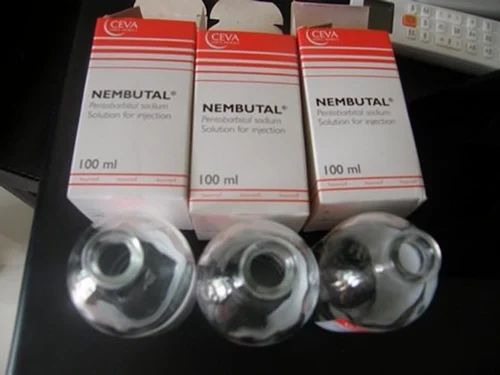Blog
What is Nembutal used for?: Medical Applications and Considerations
What is Nembutal used for?: Medical Applications and Considerations
At PentobarbitalKaufenEU, we believe in providing accurate, comprehensive information about pharmaceutical products. Today, we explore the question many of our visitors ask: What is Nembutal used for? This medication, known generically as pentobarbital, belongs to the barbiturate class of drugs and has specific medical applications that warrant careful understanding.
What Exactly is Nembutal?
Nembutal, or pentobarbital sodium, is a barbiturate medication that acts as a central nervous system depressant. First developed in the 1930s, it has been utilised in medical practice for several decades. The medication works by enhancing the activity of gamma-aminobutyric acid (GABA), a neurotransmitter that inhibits brain activity, resulting in sedative, hypnotic, and anticonvulsant effects.
According to the European Medicines Agency, barbiturates like Nembutal are controlled substances due to their potential for dependence and abuse. This regulatory status reflects the importance of understanding both their therapeutic benefits and associated risks.

Primary Medical Applications of Nembutal
Treatment of Severe Insomnia
One of the historical uses of Nembutal has been in the management of severe, short-term insomnia. The medication’s sedative properties make it effective in inducing sleep, particularly in cases where other treatments have proven ineffective. However, due to the development of safer alternatives, its use for sleep disorders has significantly decreased in recent years.
Seizure Management
Nembutal demonstrates anticonvulsant properties, making it valuable in emergencies for controlling certain types of seizures. Medical professionals may administer it when other anticonvulsant medications fail to terminate prolonged seizure activity, a condition known as status epilepticus.
Pre-Anesthetic Medication
In surgical settings, Nembutal serves as a pre-anesthetic agent. Before surgery, it helps reduce anxiety, induce sedation, and facilitate the induction of general anesthesia. This application allows for smoother transitions during surgical procedures and improved patient comfort.
Other Medical Applications
Beyond these primary uses, Nembutal has been employed in specific medical contexts, including:
- Reduction of intracranial pressure in patients with severe head injuries
- Palliative sedation in end-of-life care to manage intractable symptoms
- Diagnostic procedures requiring patient stillness or sedation
Legal Status Across Europe
The legal status of Nembutal varies significantly across European countries, reflecting different approaches to controlled substances. In Germany, the medication is classified as a prescription-only medicine with strict regulations governing its prescription and dispensation. The German Federal Institute for Drugs and Medical Devices oversees its distribution, ensuring medical necessity is established before prescription.
In the United Kingdom, Nembutal is listed as a Schedule 2 controlled drug under the Misuse of Drugs Regulations. This classification acknowledges its medical utility while implementing strict controls to prevent misuse. Healthcare providers must follow specific prescribing guidelines, and comprehensive records must be maintained.
Spain regulates Nembutal under its controlled substances legislation, requiring specialist prescription and limiting its use to approved medical indications. Across the European Union, the medication is generally recognised as a controlled substance, with each member state implementing specific regulations aligned with broader EU drug control policies.
Safety Considerations and Risk Profile
Understanding what Nembutal is used for must include awareness of its safety considerations. The medication carries significant risks that necessitate careful medical supervision:
Dependency and Withdrawal
Nembutal has a high potential for physical and psychological dependence. Prolonged use can lead to tolerance, requiring higher doses to achieve the same effect. Abrupt discontinuation may result in severe withdrawal symptoms, including anxiety, tremors, insomnia, and in extreme cases, seizures or delirium.
Side Effects
Common side effects associated with Nembutal include:
- Drowsiness and dizziness
- Impaired coordination and judgment
- Memory problems
- Nausea and vomiting
- Respiratory depression (at higher doses)
Contraindications
Certain medical conditions may preclude the use of Nembutal, including:
- Porphyria (a group of liver disorders)
- Severe respiratory insufficiency
- History of substance abuse
- Severe liver or kidney disease
Nembutal Compared to Other Barbiturates
When examining what Nembutal is used for in comparison to other barbiturates, we find several distinctions. The table below outlines key differences:
Modern Alternatives to Nembutal
With advances in pharmacology, several safer alternatives to Nembutal have emerged for its various indications:
For Insomnia
- Benzodiazepines (temazepam, lormetazepam)
- Non-benzodiazepine hypnotics (zolpidem, zopiclone)
- Melatonin receptor agonists (ramelteon)
For Seizure Management
- Newer anticonvulsants (levetiracetam, lacosamide)
- Benzodiazepines (diazepam, lorazepam) for acute seizures
For Pre-Anesthesia
- Propofol
- Midazolam
- Dexmedetomidine
These alternatives generally offer improved safety profiles, particularly regarding respiratory depression and dependence potential.
Proper Medical Supervision is Essential
When considering what Nembutal is used for, it’s crucial to emphasise that this medication should only be used under strict medical supervision. Healthcare providers must carefully weigh the potential benefits against risks, considering individual patient factors and the availability of alternative treatments.
At PentobarbitalKaufenEU, we advocate for responsible use of all medications, including Nembutal. We believe that informed patients, working collaboratively with healthcare providers, can make the best decisions regarding their treatment options.
Frequently Asked Questions
Is Nembutal legal for personal use in European countries?
Nembutal is classified as a controlled substance throughout Europe. It is only legal when prescribed by a qualified healthcare professional for specific medical conditions. Personal possession without a valid prescription is illegal and may result in legal consequences.
How is Nembutal typically administered in medical settings?
Nembutal can be administered through several routes, including oral capsules, intravenous injection, or intramuscular injection. The method of administration depends on the medical indication, required onset of action, and patient-specific factors.
What are the signs of Nembutal overdose?
Signs of Nembutal overdose may include severe drowsiness, confusion, slurred speech, extreme weakness, slow breathing, cold and clammy skin, dilated pupils, weak pulse, fainting, or loss of consciousness. Nembutal overdose is a medical emergency requiring immediate attention.
Can Nembutal be used for long-term treatment of chronic conditions?
Due to risks of dependence, tolerance, and adverse effects, Nembutal is generally not recommended for long-term use. Most medical guidelines limit its use to short-term applications or specific emergencies, with regular reassessment of its continued necessity.
Are there natural alternatives to Nembutal for sleep disorders?
Several natural approaches may help with sleep disorders, including improving sleep hygiene, cognitive behavioural therapy for insomnia (CBT-I), valerian root, chamomile, and melatonin supplements. However, these alternatives may not be appropriate for all conditions that Nembutal treats, and consultation with a healthcare provider is essential.


 Deutsch
Deutsch Español
Español Français
Français
Pingback: What Type of Drug is Nembutal? | Everything you need to know